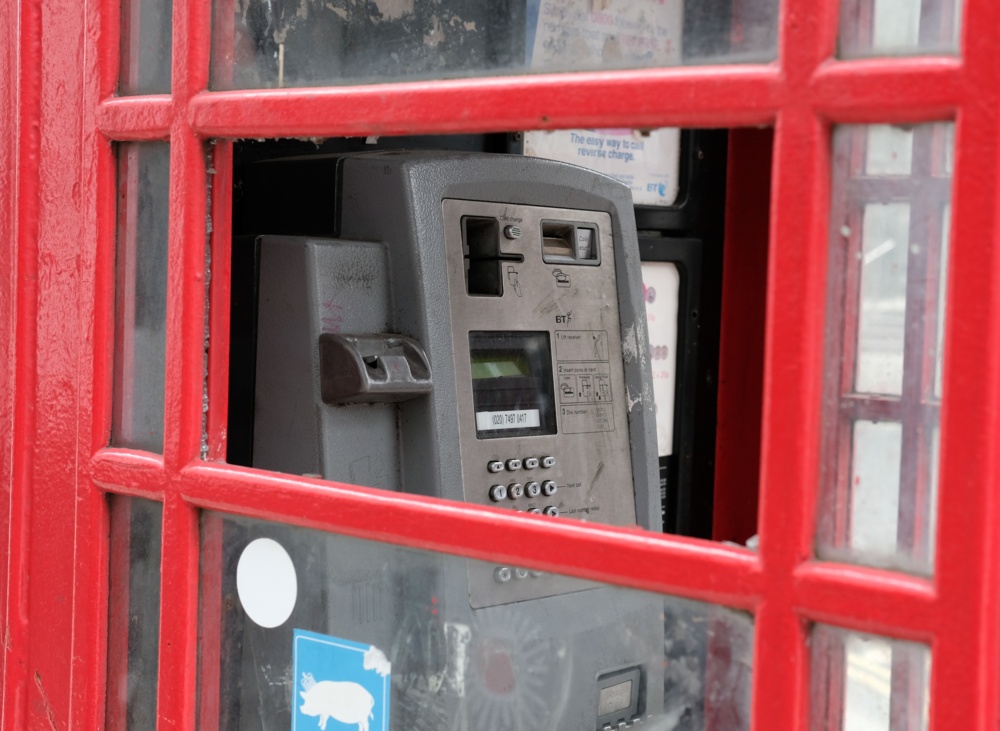
When I was a youth I was prone to hog the home phone to the annoyance of parents and siblings who would also have liked to make the occasional call (or, more usually, sat in hope of receiving important news). It was the only means of instant long-distance communication we had in those days before the internet, before the mobile phone and before email or texting. It was written correspondence, time consuming and painful, or a phone call. There was nothing in between. The telephone landline was in its heyday, making rapid inroads into the housing estates all over the country where, until the 1960s, domestic telephones had been a rarity.
The home phone (or a telephone box when away from home) was a lifeline. But arranging to meet friends was always fraught with difficult because there was no way of calling to say “on the way” or “I can’t make it today”. We languished on street corners waiting and wondering before giving up in disgust.
Rot
The rot in landlines started with the street telephone kiosk which has all but disappeared following the almost universal adaption of mobile phones. I wouldn’t even know where to find a phone if I happened to leave home without my mobile. Those “telephone boxes” that still exist are forbidding, mouldy old places full of graffiti and more than likely the equipment has been vandalised, as in the picture above.
Now, however, it is the turn of the landline phone at home to feel the draught. In my house it gets very little use. I never use it to make calls and I have just two friends who insist on using it instead of their mobiles (do they even have one, I wonder). The phone sits unused from week to week and I do sometimes wonder why I keep it. Compared with an all-you-can-eat mobile contract, the landline is an expensive bit of kit. It is so little used that every time it rings I realise that’s another £5 down the drain.
Phone free
It’s no surprise, then, to find that only 2% of young people now use the home phone to make calls. It has the advantage of leaving the instrument free for siblings and parents to hog; but even they have turned to the convenience of mobile.
The very concept of a telephone attached to a vast network of cables is now looking decidedly 20th century. Our Androids and iPhones are no longer even “phones” because they do so many other things. Apple would do better to call it the iCommunicator. I seldom make voice calls and those that I do make are normally VOIP¹ connections where I am using the data bundle instead of the call allowance. With my mobile contract, over three devices (two iPhones and an iPad) I get unlimited calls, unlimited texts and 10GB of data a month for just over £19. The British Telecom landline usually costs around £25 for two or three calls a week.
The rapid development of international communication has made this possible. It has also widened our horizons. No longer are our friends confined to the same town or city; they could just as well be in Australia, the USA or China. All can be reach easily and cheaply using the cell phone and VOIP.
Reasons
Nowadays there are very few reasons to keep a physical landline. One of the most compelling is the need to use the telephone line for feeding broadband into the house. Unless you have a cable connection, as I do, you are probably stuck with the landline. But there are other reasons.
Emergency use is important. The landline is more reliable and it is easier for emergency services to pinpoint your actual address in case of need. With the cellphone you have to give an address. Although the approximate area can be determined, it is not much use in a real emergency..
There is one little known reason to keep that phone. Without it, your credit rating could take a dive. Having a landline phone is still one of the plus points on your credit score. Without one you are in danger of being regarded as an uncreditworthy fly-by-night who probably doesn’t qualify for one. But attitudes are changing fast.
The reliance on the landline is falling rapidly. This will call into question the charging method of telephone service suppliers such as British Telecom. An average of £17 in charged just for having a telephone, before calls. With a cable service, such as Virgin Media, I can have a broadband and television service (or even a telephone), for instance, without the need for a physical telephone line. The time will come when BT and other suppliers will have to offer broadband over the existing lines without the a compulsory telephone service.
It is only a matter of years, perhaps as few as two or three, before the decline of the landline reaches epidemic proportions and the industry will have to react.
- Subscribe to Macfilos for free updates on articles as they are published. Read more here
- Want to make a comment on this article but having problems? Please read this
________
- Voice Over Internet Protocol ↩︎


You can have it on mobile as well nowadays, of course. As for the Gardai, we need them here. You guys have Scotland Yard and the Met etc.
William
And another one. My house alarm system is connected to my landline and the police.
William
Good point, William, so is mine. I had completely forgotten about that. The only difference is that the Gardaí wouldn’t come this far. But probably more efficient overall, I imagine.